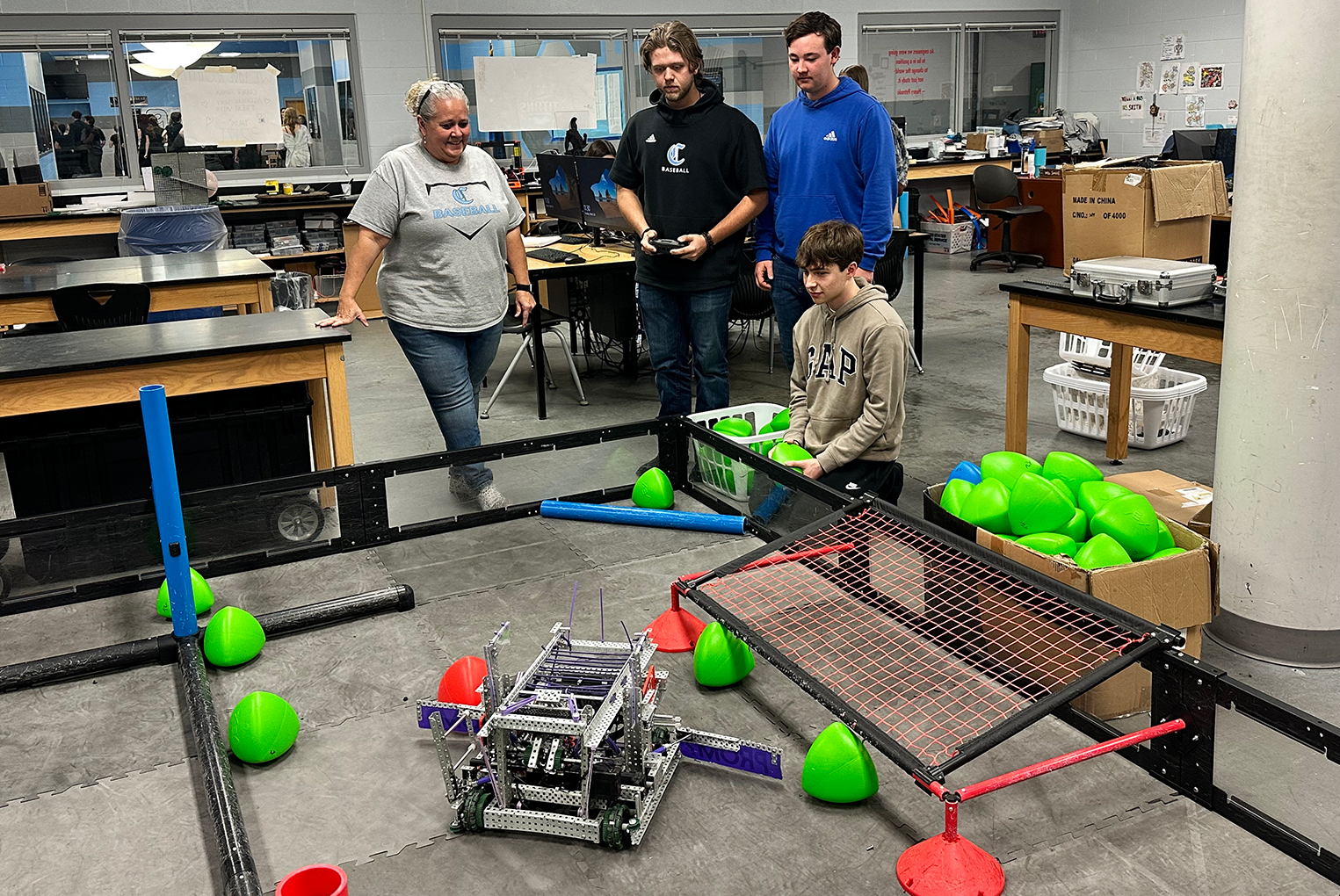
Kathryn LeRoy, senior adviser to APQC Education, and Steve Carroll, Lee County Schools instructional supervisor and professional development coordinator, go over the district’s plan to allow teachers to take control of their professional learning.
By Brenna R. Kelly
Brenna.kelly@education.ky.gov
Reserving a school bus for a field trip was once a complicated endeavor at Lee County Schools. Teachers had fill out to forms which then had to be signed by several people at both the school and the district offices.
“We were finding that with the paper copies, sometimes bus requests were getting lost in the shuffle,” said Lee County Superintendent Jim Evans. That meant employees spent valuable time search for forms, filling out new ones or tracking down one last person for a signature.
Now, teachers request buses online.
The new time- and money-saving process is just one of the ways the Kentucky Education North Star Project has helped the 1,000-student district be more efficient. The project, led by the Kentucky Association for School Administrators (KASA), helps districts analyze their operations in hopes of saving both time and money that could be spent on improving student achievement.
“For a small district, we are looking to be as efficient as we possibly can in everything that we do,” Evans said. “Anything that we save we are putting it right back into the district for our instructional work.”
In the past two school years, KASA has helped 23 school districts across the state save more than $2 million, said Rhonda Caldwell, KASA deputy director.
“It’s all about relocating resources back to classrooms,” Caldwell said. “That’s the goal, looking for what funds can we save, what waste can we eliminate, what can we do to be more efficient and put resources back in the classroom whether they have a monetary value or not.”
The program began in 2013-14 when then-Kentucky Education Commissioner Terry Holliday saw how it could benefit financially strapped districts across the state, Caldwell said. Boone County schools in northern Kentucky already had been using North Star and Holliday believed the cost savings could be replicated in other districts.
Grants funded by the Kentucky Department of Education pay for process and performance management experts from APQC Education to analyze and help restructure a district’s daily operations.
“This is an excellent way for us to show that we are constantly evaluating and re-evaluating how tax payer dollars are being used so that we can bring absolute best possible education to our students,” Caldwell said.
The need for cost-saving was particularly urgent in Lee County, an eastern Kentucky county that has lost nearly 4 percent of its population since 2010. In just the past two years, the county lost its second- and third-largest employers.
“We’ve had reductions in staff, both districtwide and at the central office. I’ve had to adopt the practice of every time somebody retires, I’ve not replaced them,” Evans said. “A lot of people wear a lot of different hats here, so when I saw the opportunity for us to get involved, I thought it might be a way for us to sharpen up and save some money.”
The district started by examining its transportation, human resources and financial operations. In addition to the new online bus reservation system, the district also rewrote all job descriptions, streamlined hiring practices and revamped its process for purchasing.
The cost savings of more than $160,000 ensured that the district did not have to eliminate any positions this year, Evans said.
After tackling management practices, the district applied for a second grant that allowed it to examine its instructional programs and professional learning for teachers.
“We want to make sure that if we are putting x amount of resources into a program, then what are we getting back in terms of student achievement,” said Steve Carroll, the district’s instructional supervisor and professional development coordinator.
One thing they found was that the district was paying for two very similar online learning programs. They also decided to get all of the schools using the same instructional programs.
“We want to make sure that our instructional programs are as focused as they can be,” Carroll said. “When you have 10 different programs and they may all have good points, but you need to eliminate some of those programs to become more focused and be able to follow the program with greater fidelity.”

Lee County Schools staff and Kathryn LeRoy, senior adviser for APQC Education, discuss the district’s examination of its instructional programs.
The process also led the district to rethink its approach to professional learning, which used to focus on everybody listening to the same guest speaker. For example, when the district introduced Singapore Math, Carroll said, every teacher in the schools had to attend the training.
“There’s a time and a place for that type of training, but we’re trying to get down to a much more personalized professional learning,” he said.
Now teachers decide what kind of professional learning they need, Carroll said. Teachers examine their own data from principal and district classroom observations to determine their needs and then send a plan to the district.
Without the North Star project, Carroll said, the district would have continued wasting time and money without even realizing it.
“You tend to do things the way that they’ve been done in the past,” he said. “This brings a new set of eyes in to decide, how can this be more effective, more efficient.”
MORE INFO….
Jim Evans Jim.Evans@lee.kyschools.us
Steve Carroll Steve.Carroll@lee.kyschools.us
Rhonda Caldwell Rhonda@kasa.org



Leave A Comment